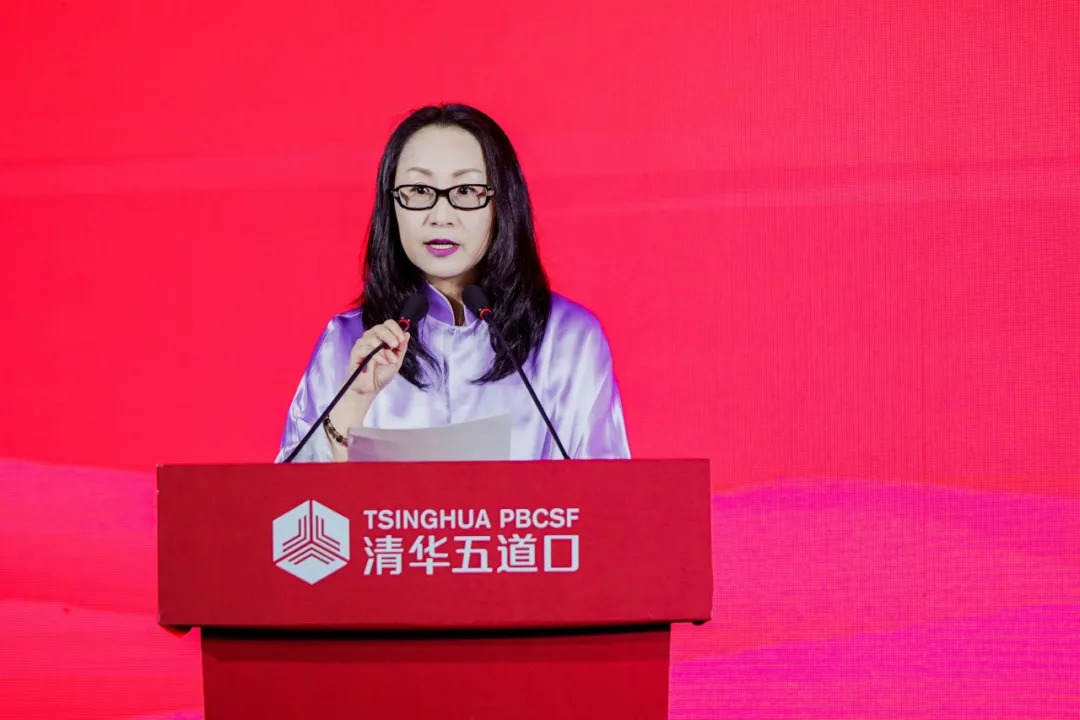On May 27-28, 2024, 80 Years after Bretton Woods: Building an International Monetary and Financial System for All & 2024 Tsinghua PBCSF Global Finance Forum were successfully held in Hangzhou, Zhejiang Province, China. On the afternoon of the 28th, the Session VII “The Macroeconomic Implications of Central Bank Digital Currencies” was successfully held.

The picture shows the conference site
Kairat Kelimbetov, Former Governor National Bank of Kazakhstan, and Christian de Boissieu; Professor Emeritus of Monetary and Financial Economics of University of Paris; ZOU Chuanwei, Director of Frontier Financial Research Center at the Shanghai Institution of Finance and Development; ZHU Yu, Associate Professor of School of Economics of Renmin University of China participated in the discussion. YANG Yanqing, Executive Head, Digital Economy Program, Shanghai AI Laboratory, moderated.

The picture shows Kairat Kelimbetov
Kairat Kelimbetov said that establishing a global economic system requires a digital financial system, and central bank digital currency is a good solution to this. Central banks do not necessarily have to monopolize digital currencies, but their role is to exercise leadership and regulate the development of financial technology. Kelimbetov believes that after the 2008 financial crisis, the trust in financial services has declined, centralized currencies are affected, and economic development is hindered. Central banks have limited impact on the regulation of digital currencies and need to enhance their regulatory capabilities as soon as possible. In the face of the digital divide and geopolitical tensions, establishing digital economic capabilities is particularly important. Central banks should lead the market in the issuance of digital currencies, resolve the differences between central bank digital currencies and private virtual currencies, to ensure their leading position in financial technology.

The picture shows Christian Boissière
Christian Boissière said that the current currency competition is between public and private sector currencies, and central bank digital currency is an important means to reduce transaction costs and achieve financial inclusion. In 2019, Meta's launch of the cryptocurrency Libra caused concerns among central banks worldwide, as it could challenge monetary policy and control over currency. Most cryptocurrencies are highly volatile, and only a few countries recognize their legitimacy. Central Bank Digital Currencies (CBDCs) can significantly reduce transaction costs; for example, China's digital yuan has already reduced transaction costs by 20%. In addition, CBDCs help achieve financial inclusion by using technology to bring more people into the financial system. With the global reduction in the use of cash, the introduction of CBDCs is timely, and although their value is lower than other financial assets, the potential benefits are huge.

The picture shows Zou Chuanwei
Zou Chuanwei said that the wholesale central bank digital currency and the multilateral central bank digital currency bridge currently being tested worldwide may significantly improve cross-border payments and change the landscape of international reserve currencies, especially promoting the emergence of a super-sovereign digital currency. Since 2020, the G20 has compared various cross-border payment options, and the basic consensus is "wholesale central bank digital currency + multilateral central bank digital currency bridge." The wholesale central bank digital currency is a tokenized form of deposit reserves, providing a new type of wholesale payment system; the multilateral central bank digital currency bridge supports the interconnection and smart contracts of multiple currencies. A super-sovereign digital currency based on a basket of currencies can be easily implemented through smart contracts, can be borrowed on the multilateral bridge and generate interest rates, and can also issue bonds in its accounting unit, forming a complete financial framework.

The picture shows Zhu Yu

The picture shows Yang Yanqing hosting the meeting
Zhu Yu said that one of the purposes of CBDCs is to promote competition in the world of online payments. The usefulness of CBDCs should not be assessed based on their use, but rather on how they change the behavior of the private sector. CBDCs can prevent the monopoly of the payment system and promote competition between banks and other payment providers. Regarding whether CBDCs will lead to disintermediation of the financial system, Zhu Yu said that it depends on the competitive structure of the banking market. If the banking industry is highly competitive, disintermediation may occur; if the competition is not intense, CBDCs will promote competition among banks, making banks more actively attract savings, thereby enhancing the role of financial intermediaries.